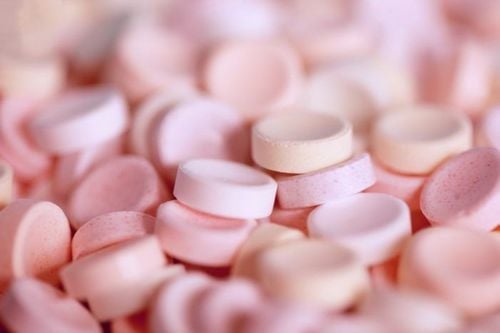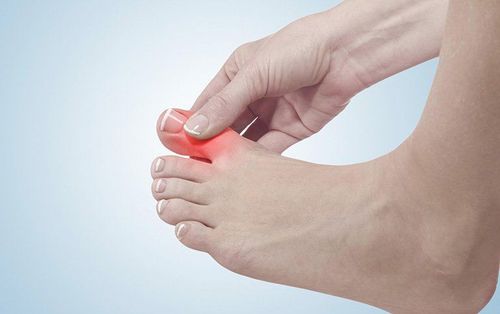This is an automatically translated article.
If the amount of uric acid in the body is too high, crystals will begin to form in the joints and cause the pain of gout. Acute pain can be relieved with anti-inflammatory analgesics or short-term steroid treatment. The choice of gout pain reliever depends on the condition of each patient.
1. What is Gout? Gout is the result of the body producing too much uric acid or not getting rid of it enough. Uric acid is a waste product your body makes naturally that is related to the purines in some foods. When you produce too much uric acid or the body doesn't get rid of it, crystals form in the uric acid in the joints and soft tissues around them. These causes painful inflammatory episodes.
Gout usually attacks the largest joint in your big toe. However, it can also attack the feet, ankles, hands, or wrists. Severe pain, redness, and swelling can begin without warning. If you start to feel a tingling, burning, or itching sensation in your joints, your body is sending a warning signal that a gout attack is about to happen.

Các loại thuốc giảm đau gút được phân loại là liệu pháp hạ urat
2. Precautions for Gout Pain Relief The American College of Rheumatology released guidelines for gout management in 2012 and updated them in 2020. They recommend gout pain relievers. classified as urate-lowering therapy for people who have experienced 2 or more attacks in 1 year and have joint damage.
Specifically, the organization recommends allopurinol as a first-line treatment for all gout patients, even those with chronic kidney disease. Next is febuxostat; both are in a class of drugs called xanthine oxidase inhibitors. In addition, guidelines recommend using anti-inflammatory drugs including NSAIDs, prednisone, or colchicine along with other medications.
If your doctor diagnoses gout and gives you medication to reduce flare-ups, take it as directed. In most cases, it can happen soon after the first signs begin.
Your doctor may prescribe a nonsteroidal anti-inflammatory drug (NSAID) such as Celecoxib, Indomethacin, Meloxicam, or Sulindac, or suggest you take an over-the-counter NSAID, such as Naproxen or Ibuprofen. The most common side effects of NSAIDs include stomach and intestinal problems such as diarrhea and nausea. Etoricoxib is better tolerated than other NSAIDs. Stomach (stomach) ulcers are a rare side effect of NSAIDs. People who are already at a higher risk of developing peptic ulcers can combine NSAIDs with medicines called proton pump inhibitors (eg, Omeprazole). Proton pump inhibitors protect the stomach lining to help prevent ulcers. Colchicine is an herbal medicine made from the crocus plant. It is thought to prevent immune cells that are involved in inflammation from entering the joints. Colchicine can effectively relieve acute gout pain. It is important to start treatment within the first 36 hours of gout. Colchicine is not used much these days because it can take up to 24 hours to fully work. But this is an alternative for people who are intolerant of other medications or cannot take them for other reasons. Medical associations advise people not to take higher doses of Colchicine because it can lead to side effects such as diarrhea, nausea, and vomiting. In addition, according to what is currently known about the drug, higher doses are not more effective. At any rate, it is important not to take more than the maximum daily dose of 6 mg. If you can't take Allopurinol or it doesn't work, your doctor may prescribe Febuxostat (Uloric). However, this drug should be used with caution because of its association with an increased risk of death from heart disease and other causes. Just because you have an acute attack of gout doesn't mean these medications aren't working. During the first few months of taking gout pain relievers, you may experience pain as your body adapts. Your doctor will probably prescribe you another medicine to take if this happens.
If you have been taking preventive medicine for a long time and have an acute attack of gout for the first time, call your doctor. Note, you must not arbitrarily use gout pain relievers at home without a doctor's prescription.
Please dial HOTLINE for more information or register for an appointment HERE. Download MyVinmec app to make appointments faster and to manage your bookings easily.













